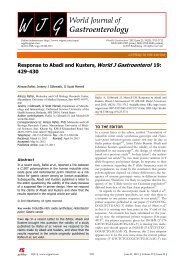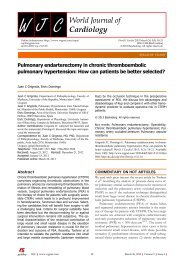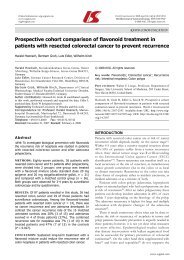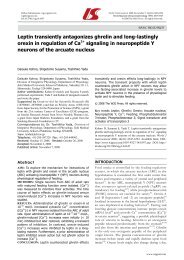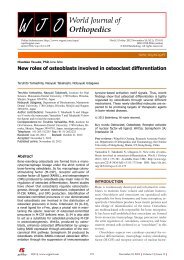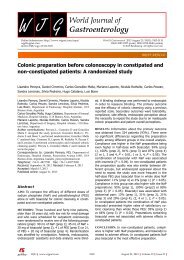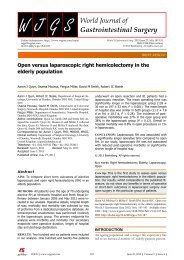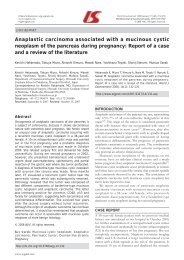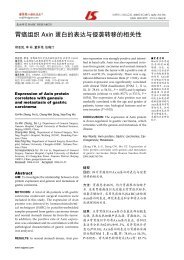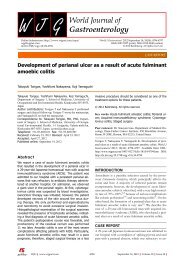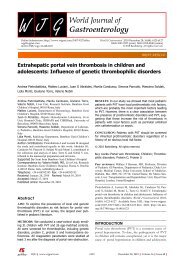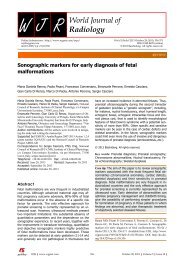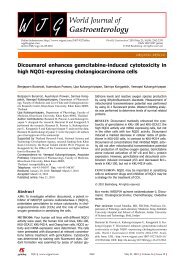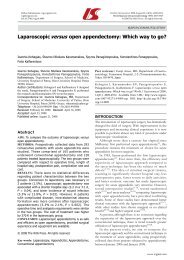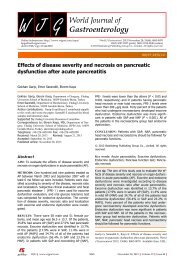18 - World Journal of Gastroenterology
18 - World Journal of Gastroenterology
18 - World Journal of Gastroenterology
Create successful ePaper yourself
Turn your PDF publications into a flip-book with our unique Google optimized e-Paper software.
PO Box 2345, Beijing 100023, China <strong>World</strong> J Gastroenterol 2007 May 14; 13(<strong>18</strong>): 2622-2625<br />
www.wjgnet.com <strong>World</strong> <strong>Journal</strong> <strong>of</strong> <strong>Gastroenterology</strong> ISSN 1007-9327<br />
wjg@wjgnet.com © 2007 The WJG Press. All rights reserved.<br />
RAPID COMMUNICATION<br />
Expression level <strong>of</strong> beta-catenin is associated with prognosis<br />
<strong>of</strong> esophageal carcinoma<br />
Lv Ji, Xiu-Feng Cao, He-Ming Wang, Yi-Sheng Li, Bin Zhu, Jian Xiao, Dan Wang<br />
Lv Ji, Xiu-Feng Cao, He-Ming Wang, Yi-Sheng Li, Bin Zhu,<br />
Jian Xiao, Dan Wang, Affillted Nanjing First Hospital, Nanjing<br />
Medical University, Nanjing 210006, Jiangsu Province, China<br />
Correspondence to: Xiu-Feng Cao, Affillted Nanjing First<br />
Hospital Oncology Center, Nanjing Medical University, Changle<br />
Road, Nanjing 230032, Jiangsu Province,<br />
China. cxf551101@sina.com<br />
Telephone: +86-25-52271474 Fax: +86-25-52269924<br />
Received: 2007-01-16 Accepted: 2007-03-23<br />
Abstract<br />
AIM: To examine the association <strong>of</strong> beta-catenin<br />
with the clinicopathologic features and prognosis <strong>of</strong><br />
esophageal squamous cell carcinoma (ESCC).<br />
METHODS: Beta-catenin mRNA expression level in 40<br />
ESCC patients (28 males and 12 females, age range<br />
38-82 years, median 60 years) was analyzed by realtime<br />
PCR. Beta-catenin mRNA expression levels in tumor<br />
cells were categorized as weaker (level 1) or equal to<br />
or stronger (level 2) than those in endothelial cells. We<br />
examined the correlation between the beta-catenin<br />
expression and the clinicopathological factors and<br />
prognosis <strong>of</strong> ESCC patients.<br />
RESULTS: Level 2 beta-catenin expression was found in<br />
29 patients. ESCC with level 2 expression had a higher<br />
rate <strong>of</strong> lymphnode metastasis (0.0776 ± 0.0369 vs<br />
0.3413 ± 0.<strong>18</strong>03, P < 0.001) and deeper tumor invasion<br />
(0.0751 ± 0.0356 vs 0.3667 ± 0.1928, P < 0.001), and<br />
a poorer survival rate (P = 0.0024) than ESCC with level<br />
1 expression.<br />
CONCLUSION: Beta-catenin expression in ESCC is <strong>of</strong><br />
great importance.<br />
© 2007 The WJG Press. All rights reserved.<br />
Key words: Beta-catenin; mRNA expression level;<br />
Esophageal carcinoma; Prognosis<br />
Ji L, Cao XF, Wang HM, Li YS, Zhu B, Xiao J, Wang D.<br />
Expression level <strong>of</strong> beta-catenin is associated with prognosis<br />
<strong>of</strong> esophageal carcinoma. <strong>World</strong> J Gastroenterol 2007;<br />
13(<strong>18</strong>): 2622-2625<br />
http://www.wjgnet.com/1007-9327/13/2622.asp<br />
www.wjgnet.com<br />
INTRODUCTION<br />
Esophageal squamous cell carcinoma (ESCC) shows a<br />
poor prognosis because <strong>of</strong> the occurrence <strong>of</strong> systemic<br />
metastasis, mainly via lymphatic vessels [1–6] . Detection <strong>of</strong><br />
ESCC at its early stage is possible by X-ray and endoscopic<br />
examinations [7,8] , but there might be occult micrometastases<br />
at the time <strong>of</strong> surgery even in such cases [9,10] . In this<br />
respect, an assessment <strong>of</strong> metastatic potential is important<br />
to establish appropriate therapeutic modalities for ESCC.<br />
Previous studies have shown the prognostic significance<br />
<strong>of</strong> several clinicopathologic factors for ESCC, such as<br />
tumor size, age at diagnosis, and primary site [11,12] . Among<br />
them, depth <strong>of</strong> cancer invasion in the esophageal wall<br />
and lymph node metastasis are the main factors for ESCC<br />
recurrence [5,6,11] , and these two factors as well as distant<br />
metastasis have been included in the pathological tumornode-metastasis<br />
(pTNM) staging for ESCC [12] . However,<br />
the prognosis <strong>of</strong> ESCC, even in cases <strong>of</strong> early-stage<br />
disease (pT1), is heterogeneous, and a strategy to establish<br />
appropriate therapeutic modalities for each patient has yet<br />
to be formulated.<br />
Several biological indices for predicting the prognosis<br />
<strong>of</strong> ESCC, a number <strong>of</strong> indices, such as aberrant expression<br />
or mutation <strong>of</strong> the tumor suppressor p53, adhesion<br />
molecule Ecadherin, and cell-cycle-related molecules such<br />
as p27, have been proposed [3,13,11] . However, the utility <strong>of</strong><br />
these factors for predicting the prognosis <strong>of</strong> ESCC is<br />
controversial [15] .<br />
Recently, beta catenin and elements <strong>of</strong> the Wnt<br />
signaling pathway have been found to play an important<br />
role in the pathogenesis <strong>of</strong> human cancers including<br />
ESCC. In the present study, we analyzed beta-catenin<br />
mRNA expression level in 40 patients with ESCC and<br />
evaluated its correlation with the clinicopathologic features<br />
and survival <strong>of</strong> these patients.<br />
MATERIALS AND METHODS<br />
Patients<br />
In the present study, 40 patients underwent surgery for<br />
ESCC at the Nanjing First Hospital Affiliated to Nanjing<br />
Medical University from July 1999 to February 2000<br />
were selected. There were 28 males and 12 females (age<br />
range 38-82 years, median 60 years). An endoscopic<br />
examination <strong>of</strong> esophageal lesions was performed, and<br />
a histologic diagnosis <strong>of</strong> ESCC was made based on<br />
biopsy specimens obtained before surgery. Preoperative



